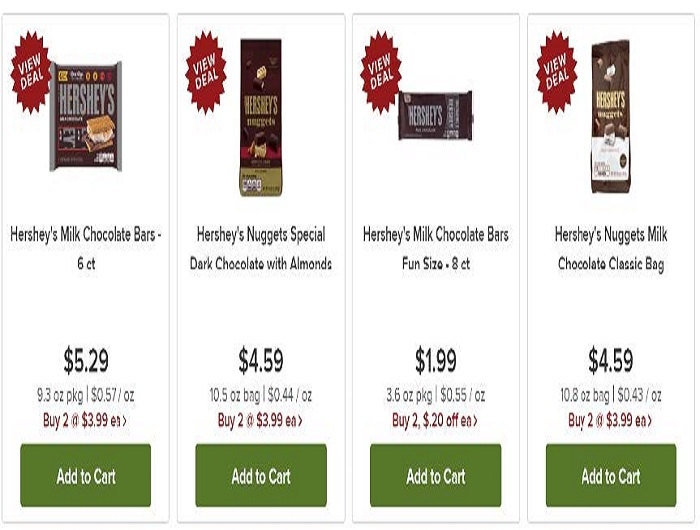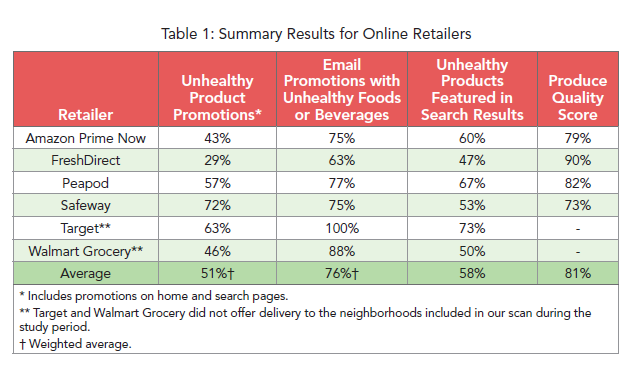Online grocery retailers undermining healthy eating, according to CSPI marketplace scan

More than half of online food and beverage promotions are for unhealthy products
Online grocery platforms are generally undermining Americans’ efforts to eat well, according to a new scan of retailers’ promotions, pricing, placement, and delivery released today by the Center for Science in the Public Interest. More than half of food and beverage promotions on online retailers’ home pages and search result pages were for unhealthy products, and more than three-quarters of the food- and beverage-related emails that retailers sent promoted unhealthy products.
The nonprofit food and health watchdog group evaluated the practices of six national retailers operating in the Washington, DC, area: Amazon Prime Now, FreshDirect, Peapod (Ahold Delhaize), Safeway, Target, and Walmart Grocery. (The latter two were not delivering in DC during the early 2019 study period, so weren’t included in the ordering and delivery components of the assessment.) CSPI researchers created two customer accounts and collected promotional data on each retailer’s home page, and promotional, pricing, and search result data on each retailer’s search result pages for five staple products: milk, bread, cereal, drinks, and chicken. The researchers also scored the quality of the produce delivered.

“Online grocery ordering has the potential to increase Americans’ access to healthy food, but thus far, the industry is not taking advantage of the opportunity,” said CSPI vice president for nutrition Margo G. Wootan. “Online grocers often engage in the same practices as their brick-and-mortar counterparts, by heavily promoting soda, chips, candy, cookies, and other junk foods and relegating healthy food to the sidelines. Position and placement matter just as much with digital marketing as they do at the supermarket.”
Fresh Direct had the lowest proportion of unhealthy product promotions (29 percent) and scored the highest on produce quality (90 percent). Safeway had the highest proportion of unhealthy product promotions (72 percent). Peapod and Safeway offered discounts on unhealthy products that were, on average, more than twice as great as the discounts they offered on healthy products.
More than half of items featured at the top of search results for staple foods were unhealthy; for example, featuring chicken nuggets in a search for “chicken.” Target featured the highest proportion of unhealthy foods in search results (73 percent).
Research suggests that online grocery shopping could help reduce impulse purchases. But targeted marketing technology allows the industry to generate promotions and custom shopping lists that may reinforce unhealthy behaviors and biases. For instance, while two-thirds of the products CSPI researchers purchased from retailers were healthy, Amazon Prime Now’s targeted promotions were mainly for unhealthy foods and beverages. All of Peapod’s targeted promotions were for unhealthy items. Amazon Prime Now and Peapod explicitly promoted products based on purchase history or street address; other retailers did not disclose whether they do.
Safeway sent the most food- and beverage-related emails to the customer accounts CSPI researchers created (18 per month); Amazon Prime Now and Target sent the fewest. Target included unhealthy products in every email.
Online grocery shopping accounts for about 6 percent of total grocery spending in the United States, with sales of nearly $17.5 billion in 2018. The Food Marketing Institute estimates that the market could grow to $100 billion by 2025. The U.S. Department of Agriculture now allows participants in the Supplemental Nutrition Assistance Program (SNAP, formerly known as food stamps) in select states to purchase groceries online, but the agency has plans to allow all participants to shop online.
“In a physical store, there is a limited amount of space in which food and beverage manufacturers can market their products,” said CSPI policy associate Darya Minovi. “Online, however, there are endless opportunities for retailers to barrage consumers with flashy pop-ups and banner advertisements, inducing impulse purchases. Retailers should ensure that food and beverage promotions support—rather than undermine—healthy eating.”
CSPI’s report, Scroll and Shop: Food Marketing Migrates Online, recommends that the USDA develop policies for online SNAP retailers to highlight healthy, not unhealthy, foods and drinks in promotions on home, search, and checkout pages and in emails. In addition, the Federal Trade Commission should complete a study of online retailers’ practices, including targeted marketing practices that use purchase and search history and customers’ race, income, or address to generate promotions. Retailers should use promotions, placement, and price to support food and beverage purchases consistent with expert dietary recommendations and should disclose sponsorships so customers can distinguish genuine search results from advertisements. And researchers should continue to evaluate online marketing, including targeted marketing, to identify practices that support or undermine healthy eating.
Topics
Contact Info: Contact Jeff Cronin (jcronin[at]cspinet.org) or Richard Adcock (radcock[at]cspinet.org).

